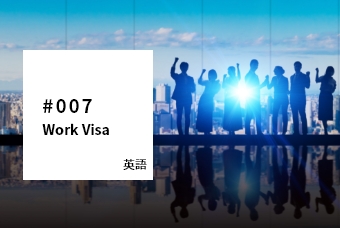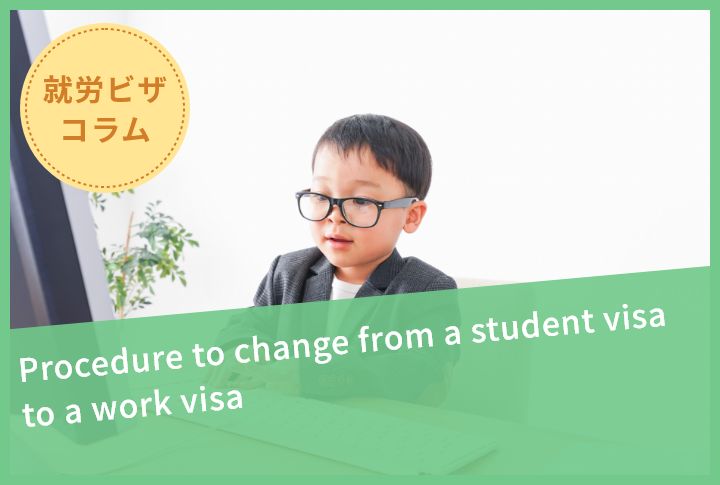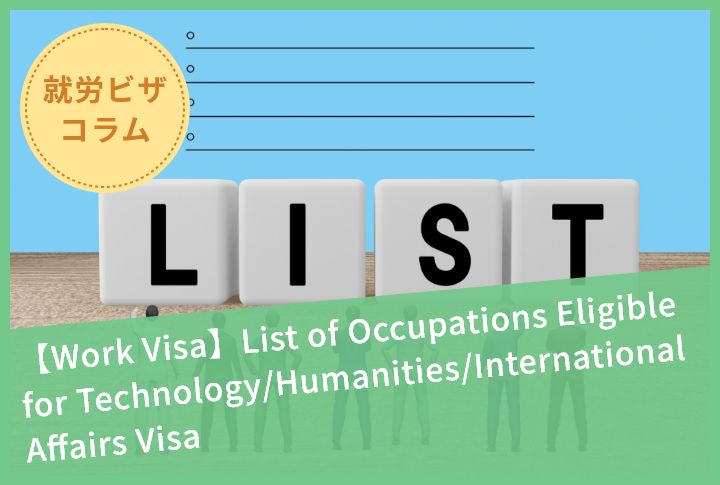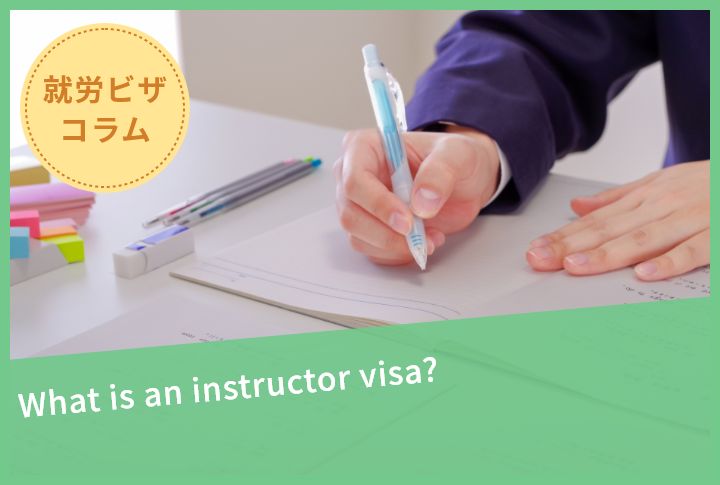【Case Study】How can a foreigner with a work visa call family to Japan?
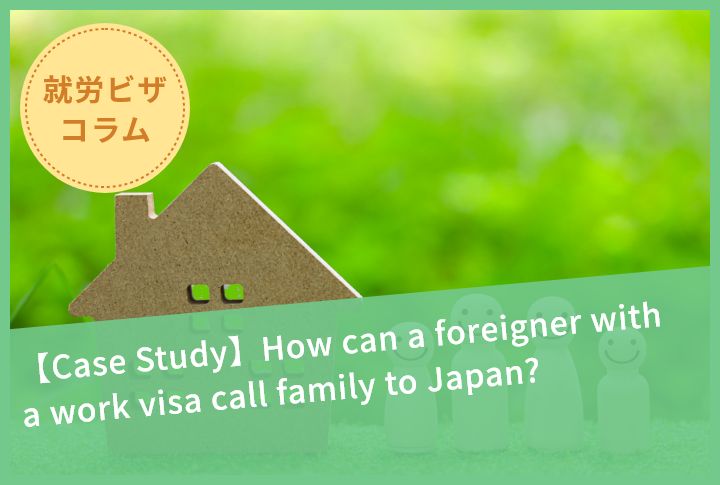
Mr. A, who is from Country X, came to Japan a year ago with a work visa (“Engineer/Specialist in Humanities/International Services”) and is currently in charge of overseas material procurement in the procurement department of a major manufacturing company Y.
Mr. A married to Ms. B while he was still in Country X, but Ms. B didn’t come to Japan with him because she was pregnant when Mr. A started working in Japan. Due to these circumstances, Mr. A came to Japan alone, but he wants to invite his family to Japan. What kind of visas are available when a foreigner with a working visa, like Mr. A, wants to call his/her family members to Japan?
In this article, we will focus on visas for foreigners with work visas to bring their families to Japan.
Index
1. What is a dependent visa?
(1) Only a “spouse and child” are subject to dependent visas
Dependent visas are given to a spouse or child who is supported by a person who stays in Japan with the status of resident of “Professor,” “Artist,” “Religious Activities,” “Journalist,” “Business Manager,” “Legal/Accounting Services,” “Medical Services,” “Researcher,” “Instructor,” “Engineer/Specialist in Humanities/International Services,” “Intra-company Transferee,” “Entertainer,” “Skilled Labor,” “Cultural Activities,” or “Student.”
Because of the term “dependent,” we often receive inquiries about if parents can be invited to Japan using the visa, but only spouses and children can obtain a dependent visa. Accordingly, if you wish to call your parents from your home country, a dependent visa will not be applicable.
You may be able to call your parents if you stay in Japan with a highly skilled professional visa, or if you can obtain a designated activities visa not listed in the public notice (a designated activities visa for the support to elderly parents), which can only be obtained in exceptional cases.
Unfortunately, there is no visa for calling parents to Japan, other than a highly skilled professional visa.
(2) The requirements for a dependent visa
To bring your spouse or child on a dependent visa, the following requirements must be met:
a) The supporter of the dependents has the intension and ability to support the dependents; and
b) The spouse or child needs to be supported or is supported.
The “spouse” here must be legally married and does not include the cases of de facto marriages, same-sex marriages effectively formed in foreign countries, and partnerships.
The “child” here includes an adopted child in addition to a biological child. Moreover, not only minors but also children who have reached the age of majority are eligible, but please be careful if the child is an adult. The reason is that if the child is an adult or is close to the age of majority, the immigration authority will consider that there is not much necessity to be supported. Therefore, when applying for a dependent visa for a child who has reached the working age of 16 years or older, it is preferable to submit materials that clarify the purpose of staying in Japan and the need for support.
2. Is working permitted by a dependent visa?
In principle, dependent visa holders are not permitted to work. As an exception, they can work within 28 hours per week if they obtain permission to engage in activity other than that permitted under the status of residence previously granted (so-called permit for a part-time job).
If you work with a dependent visa without obtaining such permission, you may be accused of the crime of engaging in activity other than that permitted under the status of residence previously granted (Article 24, item (iv)(a), and Article 73 of the Immigration Act). Therefore, please make sure to obtain the permission when you engage in work activities.
The permission to engage in activity other than that permitted under the status of residence previously granted given to dependent visa holders is a comprehensive permission for a part time job, just like that given to student visa holders. So, you can acquire it even before you find a part-time job. If you wish to work part-time, we recommend you to acquire the above permission in advance, so you won’t have trouble by forgetting to get the permission when you work.
3. What happens after children on dependent visa grow up?
As a child grows up and becomes able to earn an independent livelihood, the child is no longer be eligible for a dependent visa because there is no need to be supported by parents. However, from a humanitarian point of view, it is not desirable for a child who came to Japan when he/she was young, received education in Japan, and has lived in Japan for many years, to be forced to return to his/her home country.
For that reason, in some of the cases where a child has received most of the compulsory education in Japan and has graduated from a high school in Japan (while generally, at least 10 years of education before graduating from high school is required), such child is given permission to change to a resident visa based on the high degree of settlement in Japan.
This type of long-term resident visa is not stipulated in the public notice of the Ministry of Justice, but recently, the Ministry of Justice tends to permit this visa relatively easily.
4. What happens if the supporter of dependents loses status of residence?
If the person supporting dependents loses his/her status of residence because he/she left his/her job, etc., his/her spouse or child residing in Japan on a dependent visa will no longer be eligible for the visa. This is because a dependent visa is based on the premise that the person supporting dependents have a status of residence.
Moreover, if the person supporting the family receives a permanent resident visa, his/her spouse or child who has a dependent visa will lose the visa. This is because permanent residents are not eligible as the person supporting the family with a dependent visa. In this case, the spouse will need the visa of “Spouse or Child of Permanent Resident,” and the child also must promptly apply for a visa of “Spouse or Child of Permanent Resident” or a long-term resident visa.
If the person supporting dependent visa holders receives a permanent resident visa, the dependent visa holders should promptly apply for permission to change the status of residence at the relevant immigration office.
5. Summary
Mr. A in above case receives about 380,000 yen every month from Company Y, and has sent monthly allowance to Ms. B living in the country X as her living expenses.
We asked Mr. A to obtain a certificate of the marriage with his wife, a birth certificate of his child, and remittance records.
About 2 months after applying for a dependent visa, Ms. B and her child successfully obtained the Certificates of Eligibility. Currently, Mr. A’s family is living happily in Japan, all 3 of them together.
As you can see from how difficult it is to call parents, the status of residence system in Japan is not fully developed yet to attract foreign families. We believe families have right to live together naturally.
As Japan’s internationalization has been accelerating and the number of foreign workers in Japan has been increasing, the number of foreigners residing on dependent visas has been increasing year by year. On the other hand, the number of foreigners who are having troubles because they cannot live with their families is also increasing.
“I want to live with my family!”
If you are worried and would like to protect such natural right, please feel free to contact us.








